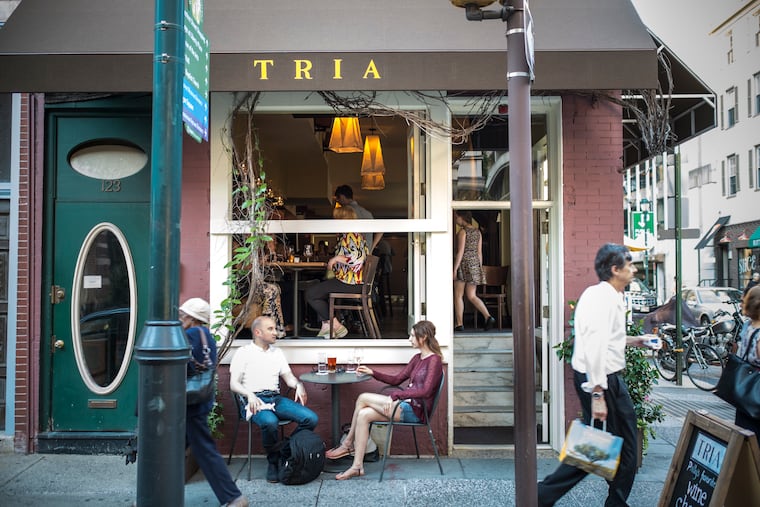Tria founder: I’ve borrowed $2 million to keep my restaurants afloat. It’s not enough. | Opinion
Congress is reviewing the proposed $3.5 trillion budget reconciliation package — but why doesn't it include more funding for the Restaurant Revitalization Fund?

It feels just like March of 2020 for restaurants.
Philadelphia enacted a mask-or-vaccination mandate on Aug. 12 to instill confidence in customers and protect our community. Guests are once again afraid to eat indoors. Reservations in restaurants in Philadelphia are down over 45% below their 2019 levels. Fewer people are dining out; revenues have started to decline once more. Our businesses desperately need help.
The situation for our industry is far more dire now than it was at the beginning of the pandemic. We cannot endure another revenue downturn. I have borrowed nearly $2 million to get us through the pandemic, to keep our staff employed and our doors open. Some of this debt is being forgiven, but most is not. I cannot saddle this business with any additional debt, and the threat of a slow winter is terrifying.
I have done everything I can to keep my business afloat during the past year and a half. We have pivoted our business model repeatedly. We emphasized takeout even though that’s not what we do. We built outdoor dining structures that cost over $100,000. We have spent over $30,000 on heaters and propane. We have spent tens of thousands of dollars on gloves, COVID-19 testing, implementing CDC recommended practices, and so many other things to keep our teams and our guests safe. Despite all our scratching and clawing, restaurants and bars have lost over $280 billion since the start of the pandemic.
» READ MORE: Tria founder: Without help, my restaurant and others will not survive the pandemic | Opinion
I cannot continue running my restaurant like this. I am paying a premium for food prices that have gone through the roof. I want and need to pay workers higher rates so they can earn a living wage and I can adequately staff my businesses. This is an insurmountable challenge because I am coming out of a year and a half of drastically lower sales and back rent that I still need to pay. I have taken on a huge debt load just to keep my business. Now the delta variant promises to finish me off.
This week marks a major hurdle in federal efforts to save businesses like mine. Members of the Small Business Committee in Congress are reviewing the proposed $3.5 trillion budget reconciliation package. I was saddened to learn that this budget does not include more funding for the Restaurant Revitalization Fund (RRF). This grant program helped so many Philadelphia restaurants get back on their feet. If this committee fails to recognize that my business and thousands like mine need help, we are going to close. There’s no way around it.
For many of my colleagues, the immediate financial hardship imposed by the pandemic was simply too much to keep their businesses afloat. Over 90,000 had no choice but to close their doors, but those of us who are still open are barely hanging on. Thirty-nine percent of restaurants could not pay their June rent — these missed supplier, rent, and utility payments are creating a mountain of debt that will soon come due.
A few busy months of business this spring and summer are simply not enough to boost our industry out of the hole the pandemic has placed us in. We need support to recover from the past year and a half and navigate the uncertain months ahead. The costs of running a restaurant right now are much higher than they were before the pandemic. Seating restrictions, consumer hesitancy, and high cost of food make it extraordinarily difficult for restaurants’ bottom lines. Many businesses in our community are teetering on the brink of closure, but neighborhood restaurants and bars mean too much to our local economy to fail. The Pennsylvania restaurant industry comprises 26,548 small businesses, supporting 584,200 leisure and hospitality jobs and generating $24 billion for our state’s economy.
» READ MORE: Full list of places in the Philly region where you need to show proof of vaccination (so far)
The over 101,000 businesses that received RRF grants are going to survive, but more than 177,000 independent restaurants and bars applied and were left out of the first round of funding, including me. With a grant, we will keep my team employed and pay down the debt weighing over my business. Fully funding the RRF will give thousands of small businesses just like mine the relief we need to survive the pandemic and continue contributing to our communities in the months ahead.
That’s why I am urging my local congressman, Dwight Evans, and his fellow members of the Pennsylvania delegation, Chrissy Houlahan and Dan Meuser, to make allocating restaurant relief a priority as they mark up the budget reconciliation package.
Jon Myerow is the founder and operating partner of Tria and Bar Poulet in Philadelphia.